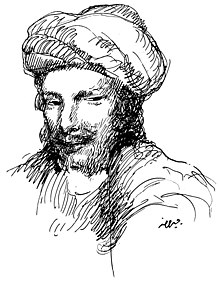Abu Nuwas
8th-century classical Arabic poet
Abu Nuwas (756–814), Arab poet; Libertine pederast, lived in Baghdad during the reigns of Caliphs Harun al-Rashid and Muhammad al-Amin. His poetry describes a life of debauchery, wine, boys and women.

Quotes
edit- Critic, relent!
Your hope for repentance
Will meet with disappointment.
For this is the life,
Not desert tents,
Not camel's milk!- Diwan, 11–12.
- You, mad to expect repentance,
Tear your robe all you want;
I will never repent!- Diwan, 11–12.
- I bought abandon dear
And sold all piety for pleasure.
My own free spirit I have followed,
And never will I give up lust.- Diwan, 164.